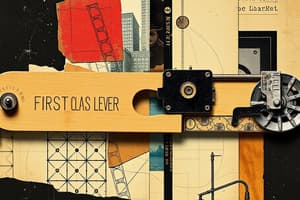Podcast
Questions and Answers
Which of the following demonstrates a first-class lever system?
Which of the following demonstrates a first-class lever system?
- Scissors (correct)
- Wheelbarrow
- Broom
- None of the above
What are lever systems in the human body formed by?
What are lever systems in the human body formed by?
Muscles and bones
What are the four primary parts of the lever systems in the body?
What are the four primary parts of the lever systems in the body?
Lever, pivot/fulcrum, effort, load
In the example of lifting a cup of water, what acts as the lever?
In the example of lifting a cup of water, what acts as the lever?
What is a first-class lever in the body similar to?
What is a first-class lever in the body similar to?
What is the example of a first-class lever in the human body?
What is the example of a first-class lever in the human body?
What occurs in second-class levers?
What occurs in second-class levers?
What is an example of a second-class lever in the body?
What is an example of a second-class lever in the body?
What occurs in third-class levers?
What occurs in third-class levers?
What is an example of a third-class lever in the body?
What is an example of a third-class lever in the body?
What does FRE 123 represent in lever systems?
What does FRE 123 represent in lever systems?
Flashcards are hidden until you start studying
Study Notes
Lever Systems Overview
- Levers are simple machines that consist of a rigid beam or rod and a fulcrum or pivot point, allowing for force amplification.
- The human body utilizes lever systems formed by bones and muscles to achieve movement and mechanical advantages.
First-Class Levers
- Characterized by the fulcrum placed between the effort (muscles) and the load (body weight).
- Similar in function to a seesaw or scissors.
- Example: The atlanto-occipital joint where the skull acts as the lever, the joint as the pivot, and neck muscles produce the effort. This allows for neck extension with a small force moving the heavier head.
Second-Class Levers
- Load positioned between the effort and the fulcrum.
- Comparable to a wheelbarrow, where the wheel acts as the pivot.
- Example: Standing on tiptoes; the toes are the pivot, body weight is the load, and calf muscles generate the effort for plantar flexion, effectively lifting the body upwards.
Third-Class Levers
- Effort is located between the load and the pivot.
- Example: Bending the elbow where the elbow joint serves as the pivot, the biceps brachii provides the effort, and the forearm/hand acts as the load.
- This lever type does not amplify force but converts a smaller force into swift movements, facilitating quick and extensive action.
Lever Components in the Body
- Anatomical levers consist of:
- Lever: Bones act as the levers in the human body.
- Fulcrum: Joints serve as the pivot points where bones connect.
- Effort: Force exerted by muscle contraction.
- Load: The weight or resistance that is moved by the lever system.
FRE 123 Model
- An acronym representing the three critical components of a lever: Fulcrum, Resistance (Load), and Effort.
- Positioning of these elements affects the type of lever system and thus its mechanical advantage or efficiency in movement.
Studying That Suits You
Use AI to generate personalized quizzes and flashcards to suit your learning preferences.




